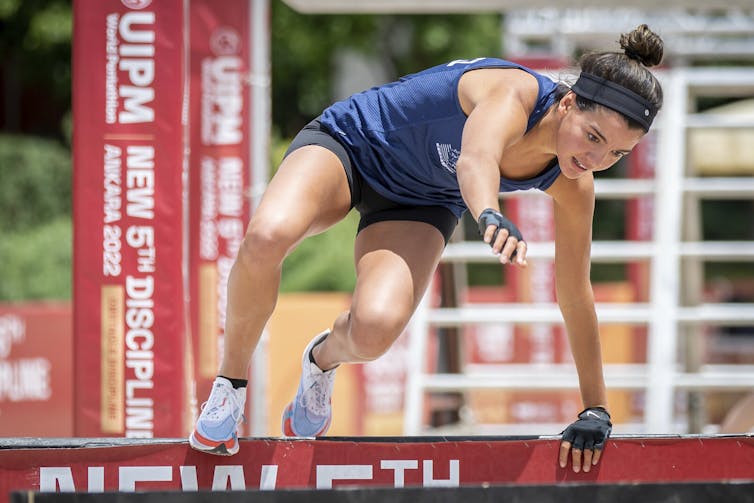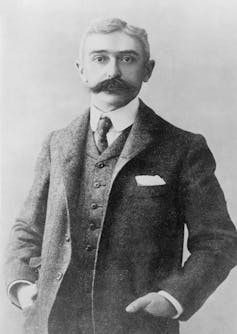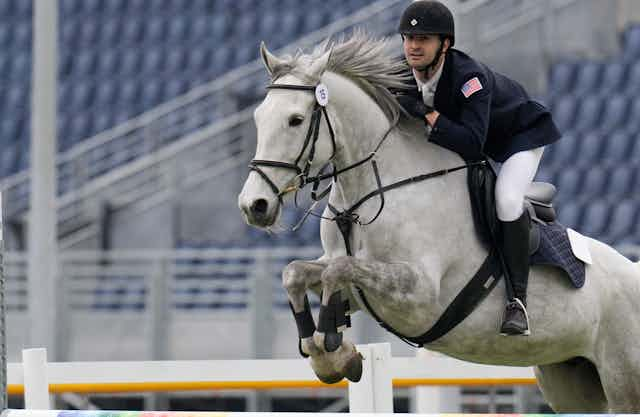The International Modern Pentathlon Union (UIPM) recently published two articles involving the long-dead founder of the modern Olympic Games, Pierre de Coubertin.
In one article, Coubertin is quoted several times as a fictional source. In another piece, a fictional interview with invented answers is held between Coubertin and the author of the article, George Hirthler. In the interview, Coubertin is used as a mouthpiece to support recent controversial reforms to modern pentathlon.
The UIPM reform centres on the inclusion of obstacle-course racing among the five sports in modern pentathlon. It replaces equestrianism, which had been a core discipline of the sport since 1912. The decision to remove horse-riding has caused the majority of pentathlon athletes to campaign against the UIPM.
For a sport organization to publish an interview with an individual that has been dead for more than nine decades is highly problematic. Here’s why.
Failing to consult athletes
The UIPM is closely tied to Coubertin. The French baron reintroduced the pentathlon to the modern Olympic Games in order to reflect military skills and produce the “complete athlete.” The UIPM also has a Pierre de Coubertin Commission that includes a Coubertin family descendant.
The fictional interview with Coubertin is a continuation of the federation’s failure to consult athletes during its reform process, through which it also contradicts the International Olympic Committee’s call for more athlete-centered policies.
The UIPM has been actively suppressing athletes’ voices in its reform efforts. While publicly claiming athletes were integrated in the reform processes, research by Jörg Krieger, the lead author of this article, found the federation has been actively stopping athletes from speaking out.

Based on interviews with current and former elite athletes and individuals closely involved in the modern pentathlon, Krieger found UIPM officials excluded outspoken athletes from working groups, pressured young athletes to back their decisions or risk expulsion from national teams and spied on athletes’ conversations in closed social media groups.
Misuse of power, lack of transparency, clientelism and conflicts of interest are all issues that have been raised by investigative journalists and athletes.
Instead of initiating an open dialogue with independent athletes’ groups, the federation turns to fiction to justify dropping equestrianism to those most affected by the change. The UIPM’s message is: protest as you like, but the changes are inevitable; even Coubertin stands with us.
Resurrecting Coubertin from the dead
Sports governance is not fiction. It deeply impacts athletes’ lives. Many active pentathletes will likely have to end their careers because they don’t have experience in obstacle-course racing.
Another issue arises from the current challenges with information disorder. The interview might be informed by an understanding of Coubertin’s views during his life time. “You are very conversant in the issues at hand,” Hirthler tells the resurrected Coubertin in the interview.

But how could the author and the UIPM be sure about Coubertin’s opinion on laser pistol racing and obstacle course racing? Coubertin simply did not experience these events. It is all conjecture and a way for Coubertin’s ghost to be weaponized for UIPM’s gain.
Hirthler is not the first person to conduct fictional interviews with dead individuals (Kurt Vonnegut’s interview series with dead luminaries is a famed example of it being done before). Hirthler is not even the first invoke Coubertin’s ghost, although his attempt to put words into Coubertin’s mouth is arguably the most laughable.
In a 2019 speech to the IOC, Olympic President Thomas Bach made 16 references to Coubertin, concluding by saying that if Coubertin were watching them, he would be “very pleased” to see his “Olympic dream” evolving according to plan.
Whether Coubertin would be pleased to see professional athletes and women participating in his dream project is a question that Bach and others have avoided. If we are to believe Hirthler, today’s Coubertin is progressive, evolved and open to changing with the times.
In actuality, Coubertin was known to be setting a colonialist social reform agenda loaded with conservative ideas about gender, race and western dominance. He wanted the world to follow his policies, and he showed no signs of reacting to the winds of change.
A marketing ploy
UIPM President Klaus Schormann approved the fictional Coubertin interview and is quoted in the second article. He sits together with author Hirthler on the International Pierre de Coubertin Committee. We should not be surprised at his attitude toward Coubertin, however, and his approval for his federation’s attempt to resurrect Coubertin.
Scholars have long argued that sport administrators such as Sepp Blatter (football), Juan Antonio Samaranch (IOC) or Primo Nebiolo (athletics) consider themselves to be “messianic.” The latter once referred to himself as “the god of athletics.”
The changes to the pentathlon program that Hirthler attempted to justify can readily be explained as a social and economic marketing ploy designed to engage younger spectators and viewers and generate a more appealing product for sponsors and media. Hirthler’s argument would have been better served by focusing on Coubertin’s well-documented talents as a social marketer and skilled manoeuvrer.
Whether the audience will find obstacle racing “exciting,” as the fictional Coubertin prophesized, is questionable, as is his prediction that “a broader pool of competitors” will include those with military training.
At a time in history when multiple armies are involved in mass killings around the globe, invoking military training hardly seems like an appropriate selling point.
The UIPM cannot be trusted to oversee the hundreds of young athletes engaged in their beloved sport any longer. Rather, alternative ways to govern the sport with a serious focus on athletes’ involvement must be explored. Sporting bodies, such as the independent athlete representative body Pentathlon United should be considered as genuine, relevant and fact-based, rather than fictional alternatives.

